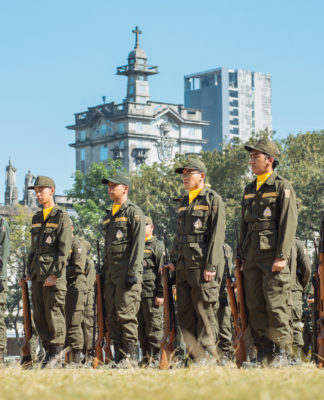A NATIONWIDE study has shown that Catholic schools in the country—including the University of Santo Tomas—strongly influence the moral values of the youth.
The research commissioned by the Catholic Educational Association of the Philippines (CEAP) and the Catholic Bishops’ Conference of the Philippines (CBCP) Episcopal Commission on Youth (ECY) found that “a Filipino Catholic youth’s religiosity in terms of his/her beliefs and practices is strongly formed by private Catholic schools.”
“Private Catholic schools have a strong influence in forming the religious beliefs (doctrine) and practices (worship) of a Filipino Catholic youth compared to public schools,” initial results of the National Filipino Catholic Youth Survey 2013 (NFCYS) released last Sept. 23 stated.
“It would be good for private Catholic schools to look into strengthening the moral conviction of a Filipino Catholic youth through more creative programs,” the study recommended. The study showed that influence exerted by Catholic schools on young Filipinos did not differ from that exerted by other Christian or non-sectarian private schools, the NFCYS said.
The study utilized a multi-dimensional survey which sought to establish the relationship between the level of religiosity of the Filipino Catholic youth and their psychological attributes, cultural and socio-political beliefs and religious participation along with the traditional lines of doctrines, worship and morals.
A total of 2,016 single Filipino Catholic youth respondents between the ages 13 and 39 participated in the survey held from July 26 to Aug. 26 in five areas: North of Luzon, Metropolitan Manila, South of Luzon, Visayas, and Mindanao.
Survey teams in 34 Philippine dioceses composed of youth ministers and leaders conducted a face-to-face oral interview with a 27-page, 140-item questionnaire in English and Filipino that lasted for two hours.
UST participated in the survey, along with De La Salle University and Adamson University in Metropolitan Manila and 15 other Catholic colleges and universities.
Catholic faith
Majority of the respondents confirmed a high degree of belief in the basic doctrines of the Catholic Church.
Ninety-eight percent of them were interested to learn more about Catholicism and 92 percent could defend their Catholic faith against anyone.
Majority of the respondents said they agreed that mercy killing could never be justified (78 percent), premarital sex was wrong (79 percent), and divorce should never be an option for married couples (79 percent).
The survey included a 50-50 percent distribution among males and females who were in-school, out-of-school, working or non-working.
However, 25 percent said they did not believe in the infallibility of the pope, while 20 percent said they did not believe that bishops and priests had the power to absolve sins. About 21 percent answered that they did not accept that those who had died in the state of mortal sin were condemned to hell.
More than half of the respondents disagreed with the Catholic Church’s position on the reproductive health law (55 percent). But this was checked by the survey result that found only a quarter did not support the Church’s teachings against contraceptives and homosexuality.
Other factors
In observing religious practices, majority of the respondents, 79 percent, said they attended Mass once to three times a month.
Gender, age, occupation, religion of parents, socioeconomic status, and father’s education were deemed significant predictors of religiosity.
“Females exhibit higher religiosity compared to males while older Filipino youth appear to be more religious compared to the younger youth,” the result stated.
It was also found that the youth whose parents were both Catholics seemed to be “more religious compared to those whose parents have different religions.”
Meanwhile, as socioeconomic status increased, religiosity of the youth also increased.
According to the NFCYS, the CBCP-ECY and CEAP “desire to know and understand the needs, concerns, situations, gifts, and talents of the youth” by being faithful to its task of making the “youth as evangelizers.”
This was the second NFCYS conducted after the first one in 2002. Jon Christoffer R. Obice














